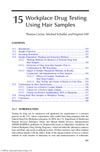 1 citations,
August 2006 in “International forensic science and investigation series”
1 citations,
August 2006 in “International forensic science and investigation series” Hair testing is a reliable method for detecting workplace drug use when done with proper sample preparation and confirmation.
[object Object]  130 citations,
August 2020 in “Drug Design Development and Therapy”
130 citations,
August 2020 in “Drug Design Development and Therapy” Nanoparticles can improve skin drug delivery but have challenges like toxicity and stability that need more research.
 28 citations,
August 2003 in “Nature”
28 citations,
August 2003 in “Nature” Cosmeceuticals may have potential but their effectiveness and market success are still uncertain.
 July 2021 in “Research Square (Research Square)”
July 2021 in “Research Square (Research Square)” Semecarpus anacardium leaf extract fights breast cancer and extends survival in mice.
96 citations,
April 2017 in “Oncotarget” Smaller nanoemulsions can penetrate skin and hair follicles better, which may be useful for delivering drugs and vaccines through the skin.
 14 citations,
August 2018 in “Journal of Pharmaceutical and Biomedical Analysis” 39 citations,
January 2013 in “Skin pharmacology and physiology”
14 citations,
August 2018 in “Journal of Pharmaceutical and Biomedical Analysis” 39 citations,
January 2013 in “Skin pharmacology and physiology” Nanoparticles show promise for drug delivery through hair follicles but not through healthy skin.
24 citations,
March 2020 in “Cells” Natural small molecules can help treat diseases by activating or inhibiting the Wnt pathway.
 May 2019 in “Asian Journal of Chemistry”
May 2019 in “Asian Journal of Chemistry” Finasteride forms three new products under acidic stress.
[object Object]  7 citations,
February 2018 in “International Journal of Pharmaceutics”
7 citations,
February 2018 in “International Journal of Pharmaceutics” Researchers developed a method to measure drugs in hair follicles and found that both water-loving and fat-loving drugs can be detected after being applied to the skin.
 3 citations,
April 1989 in “Drug Information Journal”
3 citations,
April 1989 in “Drug Information Journal” Side effects of drugs can lead to the discovery of new treatments.
 January 2015 in “Hair therapy & transplantation”
January 2015 in “Hair therapy & transplantation” Some botanical products may help increase hair growth in people with alopecia, but more research is needed.
 August 2024 in “Drug Design Development and Therapy”
August 2024 in “Drug Design Development and Therapy” Decursin shows promise for treating cancer, neuroprotection, inflammation, and hair loss.
 2 citations,
June 2023 in “Pharmaceutics”
2 citations,
June 2023 in “Pharmaceutics” Nanofiber scaffolds help wounds heal by delivering drugs directly to the injury site.
 9 citations,
October 2018 in “Elsevier eBooks”
9 citations,
October 2018 in “Elsevier eBooks” Nanotechnology is improving drug delivery and targeting, with promising applications in cancer treatment, gene therapy, and cosmetics, but challenges remain in ensuring precise delivery and safety.
 11 citations,
January 2014 in “International Journal of Trichology”
11 citations,
January 2014 in “International Journal of Trichology” Witch hazel-based hair products improved scalp irritation and were well-tolerated.
 139 citations,
October 1999 in “Environmental Health Perspectives”
139 citations,
October 1999 in “Environmental Health Perspectives” Modern science supports the use of some Ayurvedic plants for health, as ancient practices suggested.
10 citations,
March 2010 in “Journal of Food Biochemistry” Tamarind seed coats have strong antioxidant properties and could be used in health products and food preservatives.
 April 2018 in “Journal of Ayurvedic and herbal medicine”
April 2018 in “Journal of Ayurvedic and herbal medicine” Computational methods can speed up and improve the development and safety of herbal drugs.
 2 citations,
August 2021 in “Journal of pharmaceutical research international”
2 citations,
August 2021 in “Journal of pharmaceutical research international” Fenugreek seed extract in a nanoparticle gel could be a promising new treatment for hair loss.
1 citations,
May 2024 in “Pharmaceutics” Hemp is a promising ingredient for skin products due to its healing and soothing properties.
 19 citations,
July 2018 in “Medicines”
19 citations,
July 2018 in “Medicines” Juniperus plants contain compounds with potential for developing various medical treatments.
 4 citations,
January 1994 in “Yakugaku zasshi”
4 citations,
January 1994 in “Yakugaku zasshi” EPC-K is stable except at very acidic pH or when exposed to sunlight, and it can decompose in low ethanol concentrations.
 75 citations,
June 2019 in “International Journal of Molecular Sciences”
75 citations,
June 2019 in “International Journal of Molecular Sciences” Costunolide may have multiple health benefits, including promoting hair growth and protecting against cancer and diabetes, but more research is needed.
 January 2022 in “International journal of pharmaceutical sciences review and research”
January 2022 in “International journal of pharmaceutical sciences review and research” Herbal cosmetics are becoming more popular because they are safer, have fewer side effects, and offer health benefits.
 November 2016 in “Therapeutic Delivery”
November 2016 in “Therapeutic Delivery” New drugs for Alzheimer's and rheumatoid arthritis advanced, a Zika vaccine is in development, and there were business deals in anesthesia and oncology.

Plant-based compounds can improve wound dressings and skin medication delivery.
 May 2022 in “International Journal of Biochemistry Research and Review”
May 2022 in “International Journal of Biochemistry Research and Review” Plant-based biotin from SesZenBioTM could be twice as effective as synthetic biotin for hair care.
 2 citations,
January 2023 in “BioMed Research International”
2 citations,
January 2023 in “BioMed Research International” Beetroot extract nanogel may help treat hair loss caused by testosterone.
 November 2024 in “Journal of Cosmetic Dermatology”
November 2024 in “Journal of Cosmetic Dermatology” Valproic acid microemulsions improve skin delivery compared to regular solutions.

























